Cashew business and Future of South East Economy (2)
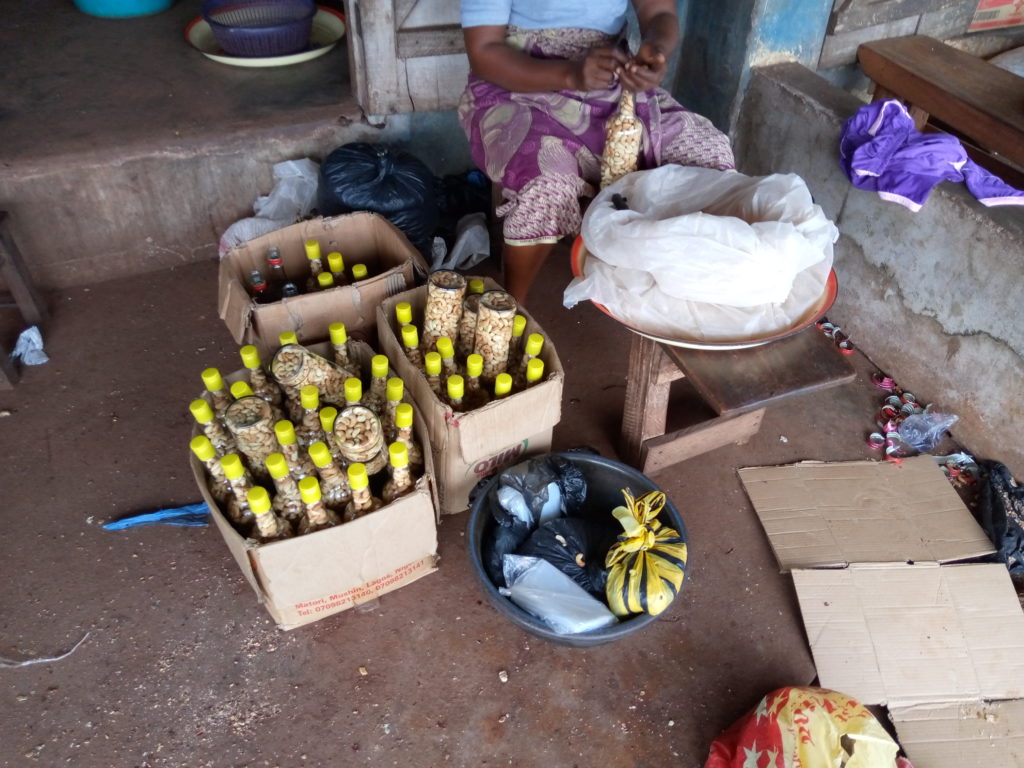
Cashew n uts packaged for sale
Cashew nuts paradox: SME’s disruption, revolution and future of South-East in the multi-Billion naira industry
By Odogwu Emeka Odogwu
Mordor predictions of cashew nuts boom
Just this October, 2019, Mordor Intelligence, an international market intelligence and advisory firm, said the cashew market was valued at $9.9 million last year and projected to reach $12.7 million by 2024 because about three Million tonnes are harvested yearly.
Mordor said of cashew producing nations, African countries contributed 56.5 per cent of the global production with Ivory Coast leading the way with yearly production of 725,000 tonnes.
The National Bureau of Statistics (NBS), said cashew nuts are Nigeria’s third-biggest agricultural export this year.
NBS said an estimated N8 billion was generated from cashew nuts exported in the first six months of 2019.
It said Vietnam, India, Tanzania, Russia and Netherlands were Nigeria’s biggest markets for cashew nuts in half-year 2019.
It said Nigeria lags behind the top three producers of cashew. Nigeria had 200,000 tonnes of cashew this year, with about 300,000 hectares of cashew plantations in the country. 70 per cent of the local production is commercialised and about 90 per cent is exported as raw nuts.
Challenges to the projections
Nigeria’s cashew industry growth rate of farming production is not catching up with the growth rate of the processing industry, as the raw cashews output only meets about 20 per cent of the demand for export processing.
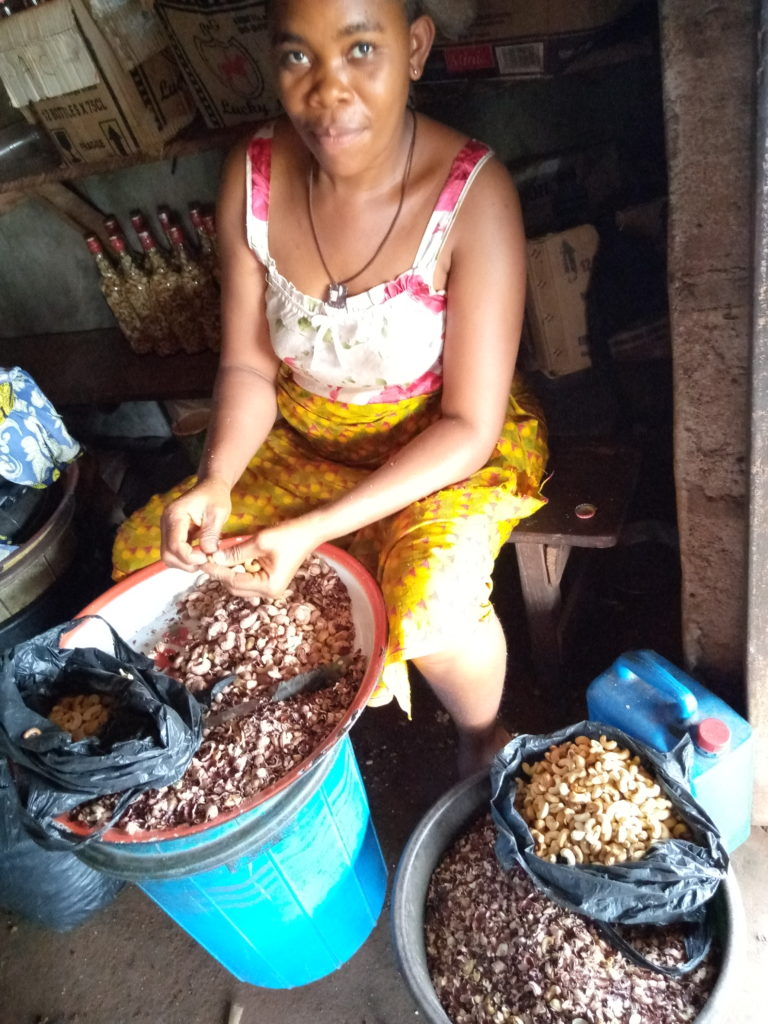
There is fiercer competition between local investors and buyers and their counterparts from China, East Africa, Thailand and Cambodia. There is stricter requirements in terms of quality and food safety now, hence, Nigeria has to process and add value to its raw cashews and nuts.
Challenges to Nigeria’s cashew development
Nigeria produces at least five per cent of the world’s cashew supply, but about seven per cent of raw cashew nuts are processed domestically due to lack of finance to build modern processing facilities.
Shrinking of cultivation area and unstable output, aging trees and abnormal weather conditions have decreased yields, and many farmers preferred other crops for higher profits, thus reducing the planted area.
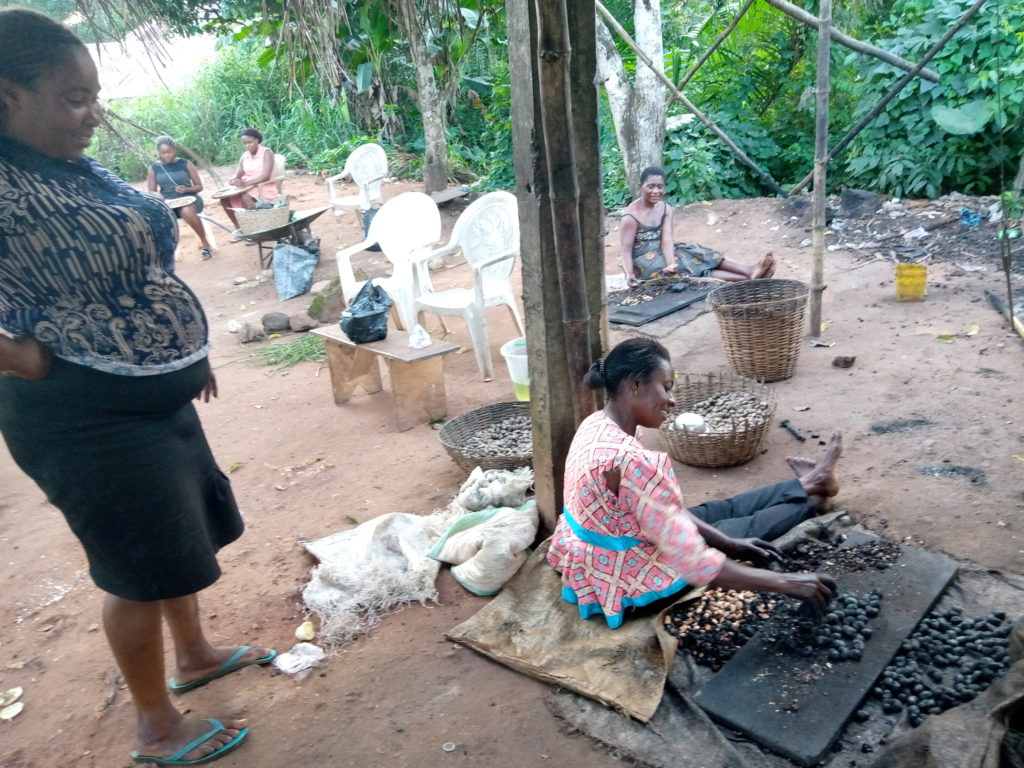
DG of RMRDC, Dr Hussaini Doko Ibrahim, confirmed these when he listed the major factors limiting cashew nut production in Nigeria as old age of most trees, deforestation, low yielding varieties, dominance of small holdings, dependence of most farmers on wild varieties, land acquisition problems, high cost of input, climatic conditions, disease, pest and fire outbreaks, high post-harvest losses, infrastructural constraints and quality, and market price of the product.
Stakeholders’ react
Delay in shipping cashew to Vietnam and India by exporters is a source of great concern as exporters are lamenting that they could not get their produce shipped in time to Vietnam and India through the seaports.
Former President, National Cashew Association of Nigeria (NCAN), Pastor Tola Faseru, recalled that in 2014 cashew exports at the seaports were delayed for weeks and months. He added that cashew cargo were left sitting, undelivered at the ports for months. He recalled that there were cases cashew cargo, remained in transit for 90 days.

He informed that by the time the produce arrived their destinations, they had lost their usefulness. Farmers and exporters receive a lower price for their produce or had them rejected by importers, hence he criticised the shipping lines for making cargoes undergo longer waits before moving them abroad. Nigeria and Nigerians lost business as the cashew nuts were rejected by Vietnam and India who process Nigerian nuts before exporting to Europe and America, even back to Nigeria.
Is Nigeria ready to export anything? Why should produce marked for export be delayed in the ports for weeks and months until the produce spoils?
An exporter, and the Country Manager, 3F Nigeria IPEX Limited, Karamvir Singh, lamented how his organisation had many containers of cashew withdrawn from the ports when the shipping line couldn’t move them in time to Asia.
India and Vietnam dependent on Nigerian cashew nuts
India and Vietnam are dependent on Nigeria’s cashew nuts. Vietnam though the world’s leading cashew nut exporter, depends on imported raw materials. Vietnam imports over one million tonnes of raw cashew every year from many countries, mainly in Africa. Vietnam’s cashew industry has invested in 500,000 hectares of plantations in Cambodia to become its major supplier.
Vietnam is the world’s second largest processor of raw cashews with a processing capacity in excess of 1.3m tonnes. In 2017, Vietnam was the top supplier for shelled cashews, accounting for 61% of the world exports, compared to India’s 23%.
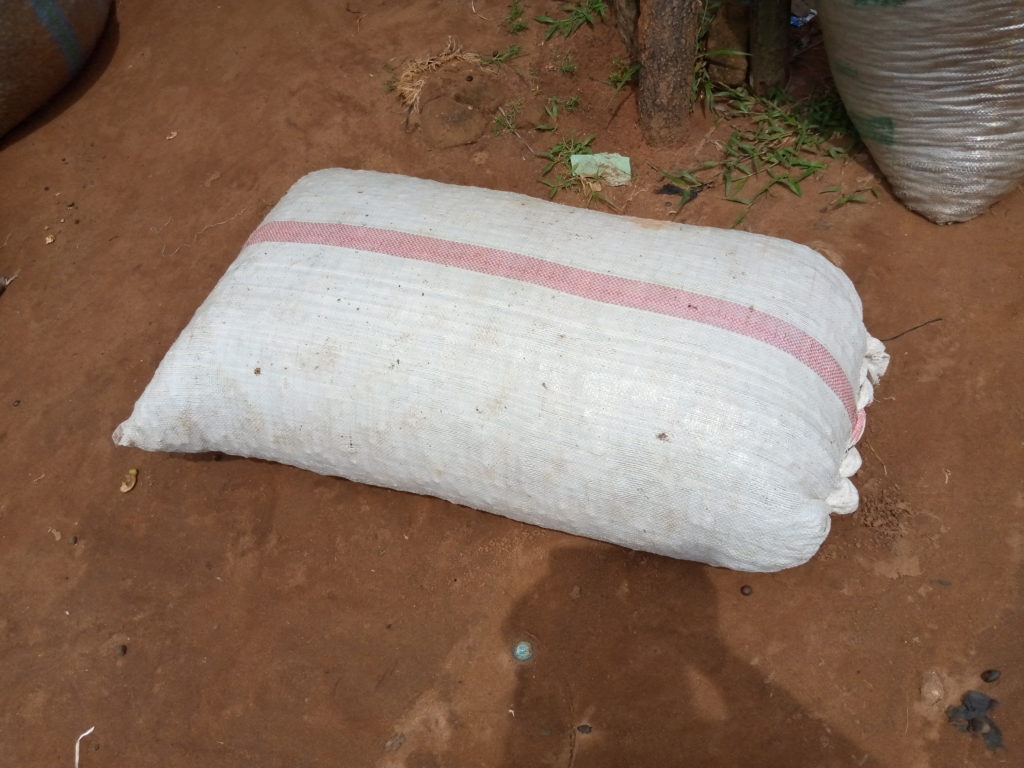
Processing of Apples into Juice and Wines
Nigeria is yet to tap successfully into using the cashew apples for juice and wine productions like Ghana has made some inroads and its products accepted in local and European markets.
Can cashew farmers tap into government’s credit facilities for a non-oil sector to turn things around?
Nigerian cashew farmers particularly those in South-East have suffered poor finance intermediation and access to finance to rehabilitate and replant; Poor access of improved planting materials and low yield of plantations due to existence of aged trees that have exceeded their prime as well as poor post-harvest handling of cashew product causing a loss of about 40 – 50% of average annual production.
West Africa cashew
Aside Nigeria, Côte d’Ivoire, Guinea-Bissau, Benin, Burkina Faso, Ghana, Senegal and Gambia are major producers in the region, with Côte d’Ivoire alone accounting for nearly half of regional production. West Africa’s total production is more that of East Africa’s 470,000 tonnes, majorly from Tanzania, Mozambique and Kenya.
The problem remained that what is produced locally, around 90%, is exported as unprocessed raw nuts to processors in India and Vietnam, after which they are processed and pushed to supermarkets in Europe and the United States. Vietnam imported around 53% of the world’s raw cashew nuts and India accounted for 45% last year. World Bank document estimates the loss of added value to about $200m worth.
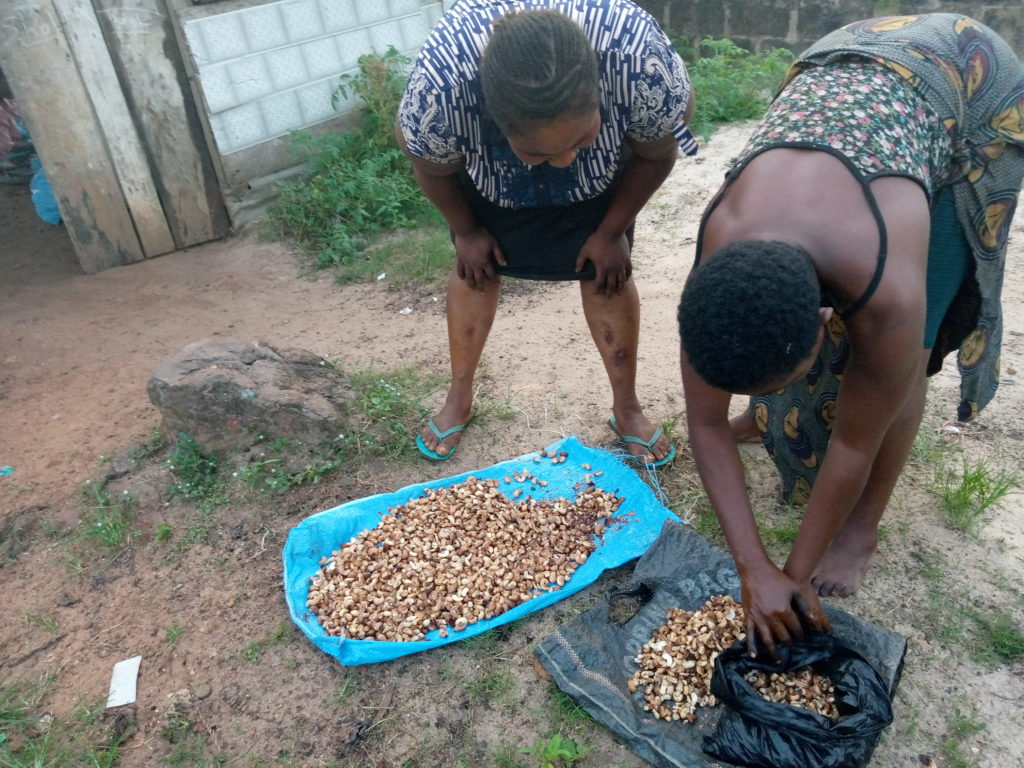
West Africa is still untapped and has large potential opportunities in processing and international processors like Singapore’s Olam International, European snack company Intersnack, Brazilian group Usibras, and Singapore’s international commodity trader Valency International are scrambling already for Nigerian nuts.
As well, domestic processors are emerging and expanding like Tolaro Global (Benin), Mim Cashew (Ghana), Anatrans (Burkina Faso), Cajou Espoir (Togo), FoodPro (Nigeria), and Cajou des Savanes (Côte d’Ivoire).
Cashew industry is worth over $7bn, with new entrants and with increased use of cashew as snacks and bakery as well as other confectionary ingredients, it has grown to 830,000 tonnes that’s 5% improvement last year.
Vietnamese conglomerate T&T Group JSC signed an agreement to purchase cashew nuts from Côte d’Ivoire and build a processing plant.
West African Challenges and need for improved processing
West African produce is mainly processed by manual means. In cashew it is not a beautiful scene to see shelling, peeling, sorting and packaging of cashew nuts done manually. Is such process free of contamination, and losses affecting cashew nuts high quality? Is there no need to invest in mechanised processing in West Africa to improve quality, reduce costs, maximise profits among others?
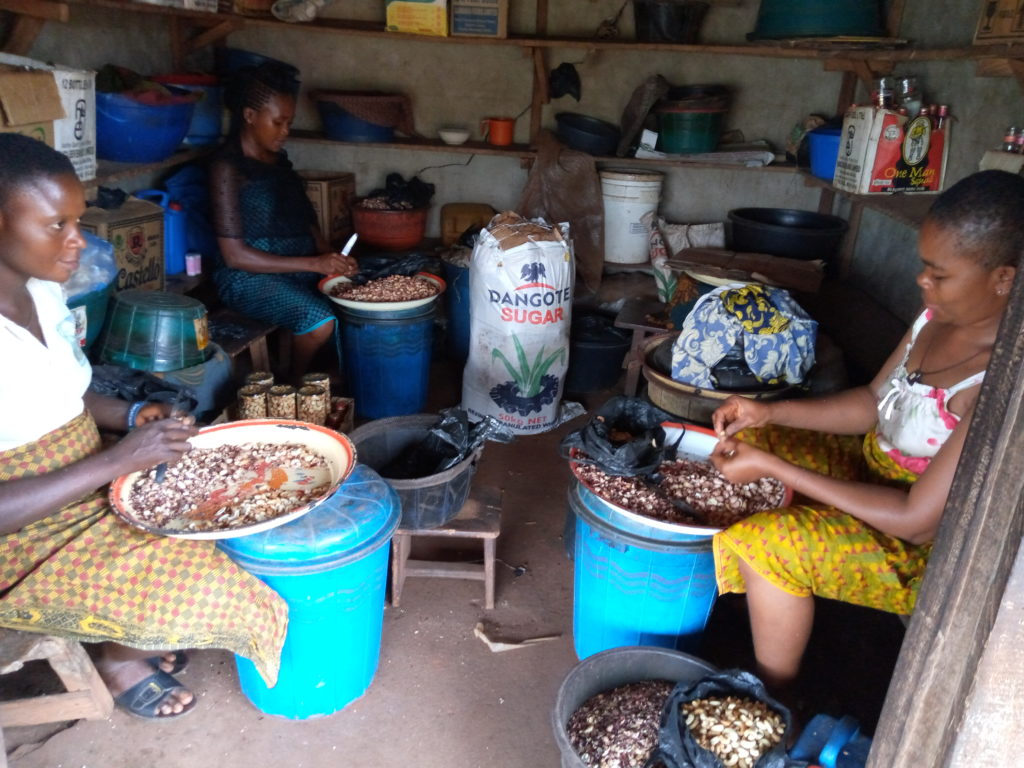
CEO of FoodPro, a Nigerian processor which began production in 2013, Ayo Olajiga insisted that high cost of mechanisation and specialised labour is a challenge for local West African processors due to poor access to finance. Can’t West African market top the industry like India and Vietnam did sequel to mechanization?

Cashew farmers in West Africa like other farmers good enough are benefiting from trainings on mechanisation, new efforts to improve the productivity from large buyers like Olam, Intersnack, Walmart, Red River Foods and Usibras. These companies partner trade groups, governments and other to train farmers for improved sustainable agricultural practices for better market access and quality.
Nigeria’s improved processing
Nigeria is the 4th largest producer of Cashew in the world and aside FoodPro, Olam focuses on purchase of cashew, cocoa and sheanuts before engaging in brands, imports and exports with about 4,000 staff in Nigeria. They have over 500,000 farmers engaged in their chain in one way or the other. Majigi agro limited owns over 100 hectares of land for cashew and other cash crops in Niger state.
Lion Cashew is the only African cashew alliance certified factory in Nigeria and it produces over 1, 500, 000 kg cashew nuts annually.
Abod success investment limited is company known for growing cashew in Nigeria and as well engages in processing and exporting of cashew nuts. National Cashew Association of Nigeria (NCAN) is responsible for regulation of the cashew industry.
New emerging cashew markets
Centre for the Promotion of Imports from Developing Countries, part of the Netherlands Enterprise Agency, reported that the European and North American market for cashew nuts is expected to continue to grow, adding that since 2013, shipments of shelled cashew nuts into Europe have risen by a yearly average of 21% in value and 12% in quantity, amounting to €1.6bn ($1.8bn) and 180,000 tonnes respectively. European imports of cashew nuts from developing countries more than doubled from €534m in 2013 to €1.34bn in 2018.
New markets from Netherlands, Germany and the United Kingdom offer good opportunities for cashew nut exporters from West Africa. Central and Eastern Europe such as Poland, Czech Republic, Slovakia, and Bulgaria are witnessing annual import growth above 30% in value and between 2007 and 2017, US imports of cashew kernels grew by about 29,000 tonnes.
Other emerging and smaller markets like Mexico, Canada, United Arab Emirates, Japan, Australia, China, Israel, and Malaysia are worth over $700m. So there are opportunities for farmers and processors to create more opportunities for the society.
Cheering News from National Cashew Association of Nigeria (NCAN)/cashew farmers
The National Cashew Association of Nigeria (NCAN) is charged with regulating the Nigerian Cashew Industry for the benefit of all stakeholders be it Cashew Farmers, Traders, Processors, Exporters and Service Providers.
Cashew is national crop and Nigeria’s annual production of cashew is 150,000 tons. Cashew is grown in 19 states in Nigeria, Kogi , Benue, Niger, Nasarawa, Taraba and Kwara states. Others are Akwa Ibom, Cross River, Delta, Edo, Ekiti, Ogun , Osun and Oyo states. And as well in Enugu, Ebonyi, Imo, Abia and Anambra states. Nigeria is the highest producer of cashew nuts in Africa and 7th in the world.
Cashew can be grown in almost all the states of Nigeria with capacity of 120,000 tons of Cashew Nut annually to show for it even with capacity for more production.
NCAN promotes the Nigerian cashew industry; encourages investment into the Nigerian cashew sector; regulates the industry for the benefit of the stakeholders; encourages increased Local and International Consumption of Nigerian Cashew and encourages increased value addition to Nigerian Cashew as well as encourages increased planting of cashew trees across Nigeria.
National Cashew Association of Nigeria (NCAN) revealed that Nigeria has become the fourth largest producer of cashew in the world since January 2018 as announced by then NCAN President, Tola Fasheru when NCAN visited the Minister of State for Industry, Trade and Investment, Aisha Abubakar in Abuja.
He said cashew farmers in the country earned N123 billion ($402 million) from the export of the cash crop in 2017 and between 2015 and 2017, they earned N284.5bn ($813.05m) in foreign exchange from the exportation of cashew.
The association revealed that Nigeria produced 220,000 metric tonnes of cashew nuts out of World’s total of 2.1 million tonnes in 2017 and exported 120,000 metric tonnes in the same year.
He called on the federal government to save the industry from folding by creating initiatives such as the provision of incentives to farmers to expand their trade and protection of farms against encroachment from foreigners.
He requested that the federal government should include the provision of N20 billion loans to the farmers to expand their trade. There is also an urgent need to address the persistent gridlock in Apapa, Lagos that affects exports and the provision of 2.6 million jute bags for bagging cashew nuts this year 2019.
The NCAN president noted that export earnings from the cash crop have witnessed a steady increase in the last two years, rising from $ 152, 000,000 in 2015, to $259,000,000 in 2016 and $402, 050,000 in 2017.
He revealed that NCAN’s major trading partners include the African Cashew Alliance (ACA), Vietnam Cashew Association (Vinacas), USAID/NEXTT. It also collaborates with the Cashew Export Promotion Council of India (CEPCI).
Faheru further informed that from 2011, cashew production figure grew from 100,000 metric tonne per year to about 220,000 which shows a significant shift in production figure motivated by encouraging international price.
He believes that for local utilization to be encouraging, government should tackle power challenge in the country to enable competitiveness among local processors and their foreign counterparts, and thus develop the industry, create employment and products for export.
This should spur Nigeria to local industrialisation and to enable processors break through due to lower prices as a result of reduced competition between export and local utilisation. Fasheru commended efforts by the federal government towards making the crop a major revenue earner, adding that Nigerian cashew nuts are highly sought-after in the international markets.
Faheru is as well Vice President West Africa , African Cashew Alliance an member of Board of Directors of African Cashew Alliance.
New President for NCAN was elected this July 2019, and he is Mr Ojo Ajanaku. He wants FG to enact policies that would promote the cashew industry. He decried that there is no law to guide the import and export of cashew as raw material from Nigeria at the moment. He added that it was important for the country to have policies regulating the cashew industry to save it from exploitation by foreigners.
NCAN efforts in bridging the gap
National Cashew Association of Nigeria (NCAN), admitted he sector is lagging behind due to lack of investment and that it is making efforts towards increasing the export value of the processed cashew nuts and it’s by products.
NCAN is set to sign a N3.6 billion memorandum of understanding (MoU) with foreign investors to boost the cashew value chain.
Newly elected National President of NCAN, Mr. Ojo Ajanaku, said the MoU would provide over N50 billion yearly investment opportunities.
Ajanaku said: “NCAN wants to increase annual production of cashew from N50 billion to N220 billion by 2020. The targeted investors are local off-takers of which we have about 20 in Nigeria, while targeting about 15 off-takers that are from foreign countries.”
He said: “At present, Nigeria is producing over 200,000 metric tonnes of cashew yearly and out of the 100 per cent of cashew that goes out, 60 per cent is from Kogi State. The aroma is what the world wants. We have the market place but we need a strategic plan on how to harness it.”
Cashew business and South East economic potentials and SME opportunities
South-East region is one out of the six regions in Nigeria and it has the capacity to jump start Nigeria’s industrial revolution through agricultural value chain based SME’s and others. Cashew value chain SME’s is one of that. This can only be possible, if the five states in the region collaborate to harness its enormous potentials abundant in agriculture of which cashew farming is one of them, manufacturing and oil and gas.

Each of the states has a unique product it is known for. Anambra state is known for manufacturing of motor parts, electrical cables among other things with markets as big as entire countries in the world but Onitsha hosts the biggest markets in Africa. Ebonyi state is leading the rice revolution, with cheap labour replete its cities to the extent they export it to other places, and Abia state, as the Japan of Africa with its ingenuity in manufacturing of fabrics and textiles related materials as well as Coco plantations.
Enugu, the coal city town is known for rice too, its local palm wine, and cuisine and Imo state , the eastern heartland known as the entertainment center of South-East is equally known too for cuisine and palm oil even though palm oil is everywhere in South East.
Facts from the national bureau of statistics, confirmed that each state in the South-East Region of Nigeria has over one-million micro, small and medium entrepreneurs (MSMEs). But let’s look at its agricultural potentials with emphasizes on the future of cashew farming in the zone, even with its comparative advantage on palm oil produce, cocoa, cassava, amongst other agricultural produce.
Is the government willing to mobilize these businesses and local resources it is using to compete favourably at the international market?
Special Adviser to the president on Industry, Trade and Investment Dr Jumoke Oduwole, had challenged the governments of the South-East region to collectively find ways to harness each state’s resources and leverage on them to key into the global value chain of the different sectors.
Oduwole is also secretary, Presidential Enabling Business Environment Council (PEBEC). At the South-East Regional Stakeholders Business Forum on Ease of Doing Business, she observed that the private sector had an important part to play in regional integration and economic development efforts, by creating bankable investment opportunities within the region.
Oduwole was marvelled at what Igbo boys do in Aba, Abia state and stated thus: “I was privileged to visit the shoe making cluster of over 30,000 shops in the world famous Ariaria International Market Aba.
“This cluster holds a special place in my heart, because it is one of the teaching case studies in a book, used at Stanford University, where I obtained my doctorate degree in international trade law. Of course, I quickly bought about six pairs of sandals”.
Can Ndigbo mobilize to grow our business and push them beyond our domestic market, by exporting to West Africa, the rest of Africa and the world?
Professor Ortuanya Simon, now Secretary to the Enugu State Government, who spoke then as Executive director, South-East Governors Forum, explained that the region was looking at six areas of development, namely, infrastructure, ease of doing business, agriculture, health, education. He observed that improving in the ease of doing business was critical in the region’s quest to move forward and to develop economically.
According to Ortuanya, “We have to know the laws, we have to harmonise the laws and we have to make the laws available.” He suggested that the forum should be replicated in all the states of the South-East region, saying, “Regional integration is the word and the way to go. It is no longer time for each state to go alone. Every state of the South-East, as far as integration is concerned, as far as development is concerned and moving forward, will do it together”.
What has happened since then? This laudable projections can be narrowed down to the cashew business in South East as it is the emerging industry of the future.
FG to set up cashew processing plants in Oyo, Enugu, others
That was a cheering news for the people of the South East in April, 2019, when the Federal Government as if listening to the yearnings of Ndigbo, announced plans to set up cashew processing plants in four states of the country to add value to the product and create employment, wealth in the country.
Minister of Agriculture and Rural Development, Chief Audu Ogbeh announced the move would also reduce the waste of cashew fruits and delay in the export of raw nuts out of the country.
According to him, we are currently wasting an estimated 8 million tonnes of cashew fruits annually.
He said the long term solution to the delay in export and stocking of cashew nuts at the ports was for Nigeria to be exporter of finished products and not raw materials.
Ogbeh listed the states where the plants would be set up to be Enugu, Benue, Kogi and Oyo.
Ogbeh said: “The challenge is usually access to credit because a good processing cashew line will cost you about two million dollars to do something like 10 to 20 tonnes a day. We are targeting that to set up at least one plant each in Enugu and Benue, two plants each in Kogi and Oyo state. These are the leading cashew producers now.
“We want to assure the cashew stakeholders that in our next level activities, we intend to stop the export of raw nuts and to process all our cashews here and we hope by the grace of God, to have one or two plants ready before next year”.
NEPC and N2Billion Obollo-Afor cashew processing factory
Even when there is no processing machine yet in Obollo-Afor, the Nigerian Export Promotion Council (NEPC) went ahead and estimated that the cashew mini-processing factory it is setting up at Obollo-Afor in Eungu State can earn N2 billion foreign exchange for the country every year.
Mr. Segun Awolowo, the Chief Executive Officer of NEPC who disclosed this during a cashew export promotion meeting organised by the Council in collaboration with United States Agency for International Development (USAID) and Nigeria Expanded Trade and Transport (NEXTT) in Lagos, said there is hope for cashew in the country.
Awolowo recalled that in 2013, cashew exports generated N17.7 billion ($110m), which represents about 10 percent of agricultural exports; however, if they compared this figure with India’s export of over US$2.5bn and Vietnam’s export of US$3bn mainly from processed kernel, annually, it means Nigeria most definitely needs a well-articulated strategy to grow the cashew sector.
Awolowo said further: “The main objective of the projects is to harness the abundant raw materials (RCN) and tap the skills of women in cashew processing. The pilot scheme if successful could be replicated by potential investors in other cashew producing states. Some investors have approached the council for possible collaboration in investing in cashew processing”.
He noted that a recent study by USAID, an increase of 20 percent from Nigeria’s current products figure would create more than 344,000 new jobs and US$75, 875,000 additional incomes, adding that, the stakeholders are fashioning out the cashew sector strategy to assist the council to develop a new implementation strategy that would grow the sector in line with the Transformation Agenda of the Government.
Is federal government neglecting the cashew production sector in South East?
Other states in Nigeria cultivate cashew but these cashew are according to market sources only roasted and baked in Enugu state, Nsukka precisely. However, let me focus on the South East. Nsukka zone, Udi and Ezeagu local government areas of Enugu State cultivation and production of cashew nuts and fruits is unequalled.
Then Anambra State government established the Premier Cashew Industry in Oghe, Ezeagu council. What has happened to the industry today? Nsukka, Udenu and parts of Oji River as well produce cashew in large quantities. Why can’t these large cashew plantations in the state serve as an elixir for springing up of SME’s related to cashew nuts processing and packaging? Why should the Premier cashew industry in Nigeria go moribund sooner than it was established? Was it sabotage, pilfering by the intended benefactors, bad management, and governmental neglect due to oil or what? What shall be done to revitalize this all important industry in South-East in particular and Nigeria at large? Are there no longer cashew plantations in these communities both communal and private cashew farms? Have the lands been encroached?
Mr Michael Eneh, the immediate past Enugu State Commissioner for Agriculture and Natural Resources had blamed the development on bad government policies. He stated that the state had no reason to be poor or complain about lack of funds should the agricultural potentials of the state be properly harnessed.
Eneh had said: “Enugu State is not left out in this quest because, we have no choice than to look inwards and showcase what we have to enable us earn revenue to develop other sources. We are investing heavily on every segment of agriculture – poultry, piggery, Pineapple, Cassava, rice, cocoyam, plantain production, bees and honey and what have you. We are looking at it as a value chain because we have arable land for all these”.
Enugu State, he said, is the home of cashew and produces one of the best cashews of export value, confirming that the government has moribund cashew plantations at different locations in the state, covering over 2000 hectares of land. And I ask, why can’t this moribund cashew plantations be revived and sustained for revenue purposes for the state?
The former Agriculture Commissioner said further: “New cashew plantations covering over 600,000 hectares are also being proposed for investments in six local governments, in partnership with the World Bank Commercial Agriculture Development Project. Prospective investors are therefore invited to take advantage of these potentials available in the state”. At what stage is this laudable initiative on cashew nuts by Ugwuanyi’s administration now? At what stage of implementation is it?
“While reviving other areas of agriculture, the state government is interested in cashew production because we remain number one in that area.
“The state government approved a new agricultural policy framework to encourage and attract foreign investments. The vision of the policy is to transform the sector into an industrialised sector that drives income growth, accelerate food and nutrition security, generate employment and transform state into a leading player in global food market to grow wealth for its farmers.”
An agriculturist, Dr. Aham Okonkwo while faulting the framework described it as “only too elitist” but also difficult to attain. He said: “Now we are talking about cashew; do you need to go far to see that what we require is processing? Why would government not make friendly policies that would enable the youths engage in the production of cashew? You don’t need to ask them to continue to pay for hiring services, when indeed you could train them and empower them with the agricultural facilities. So I find it funny.
“Again, the style of governance we have adopted is such that private people should come and own land and develop into agriculture without further assistance from government, it does not show seriousness as far as I’m concerned. Let there be a leaf from government for people to borrow from,” he added.
Cashew nuts yield and South East in focus
Cashew exploitation in the zone are for two reasons consumption and income generation. They source cashews either from wild grown in the forest on their own or from community owned cashew plantations; or sharecropping and lease arrangements practices. Most people in the zone see it as a secondary occupation hence they go with their children to harvest cashew nuts and fruits. Few are seeing it as business. Cashew exploitation is highest between months February to April.
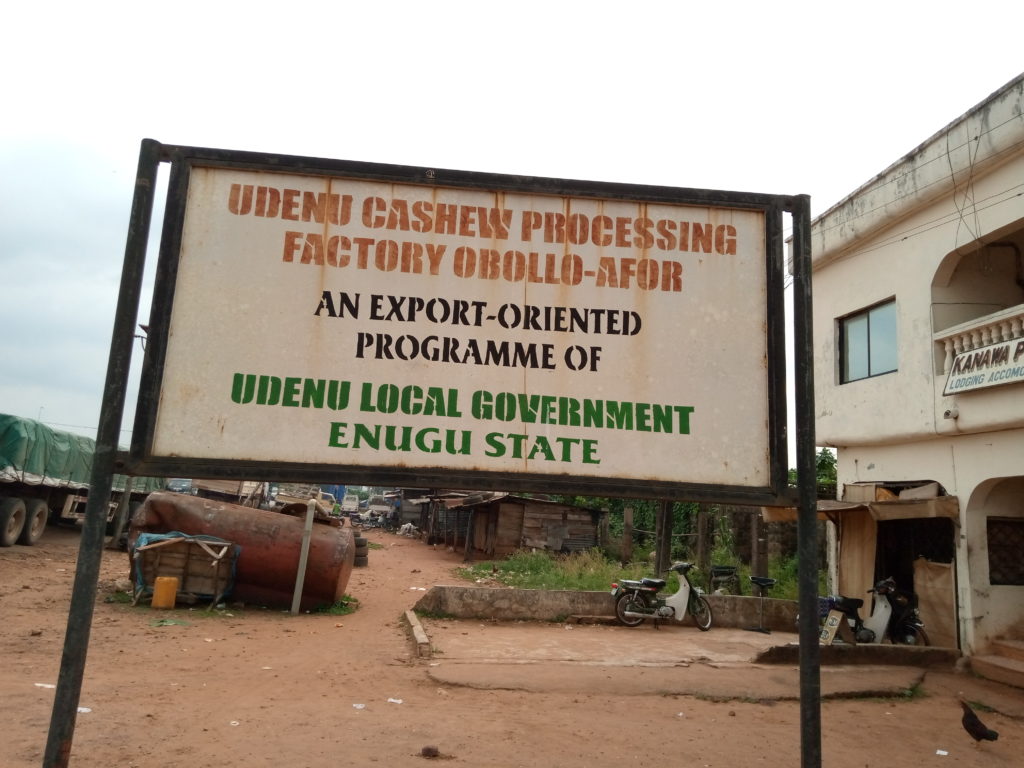
Cashew could be eaten as nuts, that’s the kernels; food that’s the fresh cashew apples. Its tree could be used as wood for firewood or for poles, and roots, with leaves and bark for medical use, and lastly for gum production.
Challenges include bush burning, pilfering, pest and diseases, rapid deterioration apples, trees produce small nuts, fluctuation of prices, poor weather condition, harassment by the original owners, snake and insect bites.
Cashew business in Ebonyi and Imo state
Cashew trees plantations are in large quantities at Okigwe, Ihubu, Neru, then some in Orlu and environs in Imo state, but sparsely found in Ebonyi state, though it can be found in small quantities in the hilly areas of Edda in Afikpo axis. It could be wrong to call them cashew plantations.
In some areas in Ikwo council area of the state, cashew crops are planted in some compounds, probably as ornamental trees or for shades.
Along Abakaliki/Enugu expressway, pockets of cashew trees could be sighted, more so, at the Ishielu axis, the border town between Enugu and Ebonyi state.
Likely, those could have sprouted or were dispersed from their neighbouring state, Enugu.
Though not in commercial quality, processed cashew nuts are sighted in shops and markets especially at the city hub, Abakaliki. A spot, opposite Abakpa Main Market, the biggest market in Ebonyi is a special spot where cashew nuts are sold. It is called Abacha Roundabout, with it frontage decorated with water fountain.
According to cashew nut operator in Nsukka from Imo state, Mr Benjamin Odika, his people do not take it serious as a business. And those who harvest it only sell the fruits whereas its nuts are harvested by outsiders and sol at Nsukka. And according to him, most of those who sale cashew nuts in the area said they buy from Enugu state.
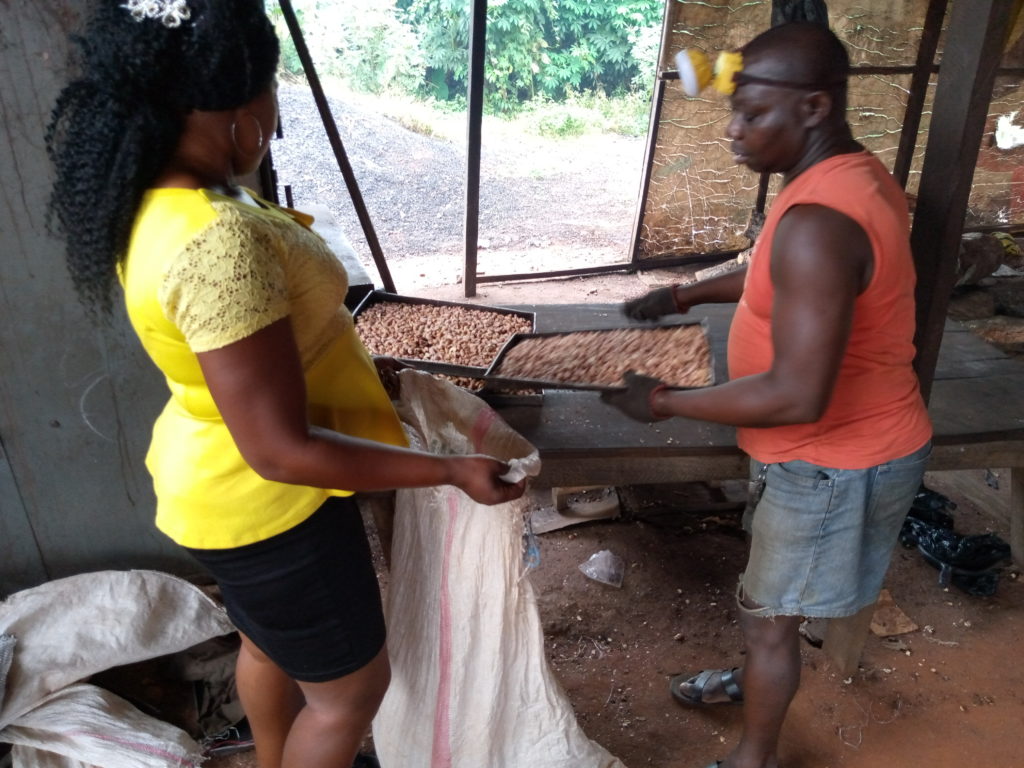
A few of them explained that they buy unprocessed cashew nuts, fry and extract the nuts for them to make more profit. Their major challenge is lack of facilities to preserve the produce.
Focus on Cashew nuts in Anambra state
I went to Awkuzu in Oyi local government area of Anambra state to investigate how it is done. Mary Ezeudu of Umudioka Awkuzu does not know who comes to buy from her little cashew plantation but what she knows is that some merchants trace her to her house to buy the nuts and cashew the same way they buy from others.
Though, they buy the seeds, she almost gave it out for nothing until someone opened her eyes on the business and she started making a living from it. She used to sell N300 and N500 but not anymore as she sells a painter N1,500 now and sometimes more.
Focus on cashew nuts in Ugbenu
At Ugbenu in Awka North local government area of Anambra state, I saw a large expanse of cashew plantation owed by Cocoa Research Institute of Nigeria. There are other pockets of cashew trees in the community.
I met a former Transition committee Chairman of Awka North, Hon Romanus Nnebenanya who told me that Cocoa Research Institute of Nigeria established the cashew farm in 1979 by Ozomena Onyali commission then, with Ugbenu as sub-station to the Headquarters at Ibeku, Abia state. Though, Cocoa Research Institute but they are planting cashew in Abia and Anambra.
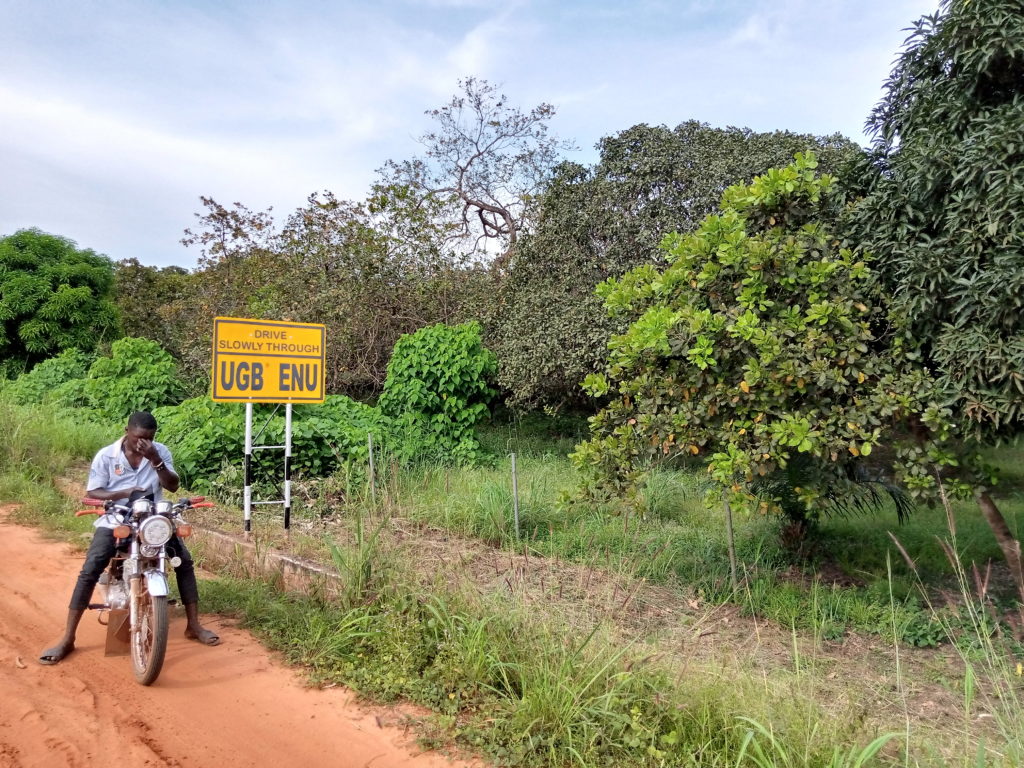
The bike that took me to the cashew plantation from Amansea after Awka capital territory charged N2,000. The state government has abandoned the road to several communities and motorists avoid plying that root. It was a hectic trip. The buildings in the planation for administrative purposes have collapsed, an indication that the workers do not come to work.
‘’There are about six staff. The manager is always there. You eat the cashew and drop the nuts. There are over 50 plots. They harvest , stock in bags to be carried away by their superior from Ibeku’’, I was told but I saw no one inside the large compound.









